- Home
- Bella Forrest
The Girl Who Dared to Rise
The Girl Who Dared to Rise Read online
Table of Contents
Problems reading?
Chapter 1
Chapter 2
Chapter 3
Chapter 4
Chapter 5
Chapter 6
Chapter 7
Chapter 8
Chapter 9
Chapter 10
Chapter 11
Chapter 12
Chapter 13
Chapter 14
Chapter 15
Chapter 16
Chapter 17
Chapter 18
Chapter 19
Chapter 20
Chapter 21
Chapter 22
Chapter 23
Chapter 24
Chapter 25
Chapter 26
Chapter 27
Chapter 28
Chapter 29
Chapter 30
Chapter 31
Chapter 32
Chapter 33
Chapter 34
Read More by Bella Forrest
The Girl Who Dared to Think 4: The Girl Who Dared to Rise
Bella Forrest
Copyright © 2017 by Bella Forrest
Nightlight Press
All rights reserved.
No part of this book may be reproduced in any form or by any electronic or mechanical means, including information storage and retrieval systems, without written permission from the author, except for the use of brief quotations in a book review.
Contents
Problems reading?
Chapter 1
Chapter 2
Chapter 3
Chapter 4
Chapter 5
Chapter 6
Chapter 7
Chapter 8
Chapter 9
Chapter 10
Chapter 11
Chapter 12
Chapter 13
Chapter 14
Chapter 15
Chapter 16
Chapter 17
Chapter 18
Chapter 19
Chapter 20
Chapter 21
Chapter 22
Chapter 23
Chapter 24
Chapter 25
Chapter 26
Chapter 27
Chapter 28
Chapter 29
Chapter 30
Chapter 31
Chapter 32
Chapter 33
Chapter 34
Read More by Bella Forrest
Problems reading?
If you experience any problems reading this ebook—such as pages skipping, etc.—it’s a common Kindle glitch. Just delete the ebook from your device and re-download it, and the problem should solve itself. If not, contact Amazon’s customer support; they’re usually very helpful and efficient.
1
Before the Tower, humanity believed in saviors. Singular individuals who were so charismatic, so persuasive, so hopeful, that those around them became infected by their cause, choosing to see the world as it could be, rather than as it was. They’d devote themselves to this person and their newfound cause, risking their lives in the hopes that their self-sacrifice would further the dream of a better world. In turn, their saviors would care for them, support them, and sometimes, if their hearts were true, sacrifice their own lives for them.
Sometimes their causes would bear fruit and bring about a change so great and profound that it sent shockwaves rippling through history. Sometimes the changes were subtler. But never were these changes, these causes, insignificant. And neither were the champions who took up the fight on their behalf.
Before the Tower, humans put faith in those they believed had their best interest at heart. Now, they did the same—only they turned to a being whose longevity was fundamentally tied to the Tower itself: Scipio, the Master AI, created to be our savior, protector, and champion, all rolled into one. He was better than human; he was eternal. He was programmed to protect the people inside the Tower… and they trusted him implicitly.
Because none of them knew the truth: that he was dying.
Then again, it seemed like a lot of people were. First Cali and Roark, then six men who had been in pursuit of Tian, the youngest member of our group, and now Ambrose Klein, the man my friends and I had been blackmailed into protecting. I was surrounded by death, and I had actually been arrested for the latest one.
Ambrose. Oh God. Ambrose.
My brain fumbled for meaning in the chaos, but all it could settle on was pointing out each of my flaws, and highlighting them in vivid technicolor. The timeline neatly laid out in my mind led directly to me: Quess’s call about Tian being chased, followed by my decision not to tell Maddox, for fear this was a trap to lure Ambrose out.
How careless I had been. How blind.
He hadn’t been any safer in his own home than he had been inside the Tourney, and I had left both him and Maddox defenseless in order to go after Tian. My stomach churned violently, bile rising to the back of my throat.
And my problems ran much deeper than just the guilt that was eating at me. Keeping Ambrose alive had been part of the deal I had made with Lacey Green, Engineer of the Mechanics Department—or Cogs, as we called them. She and Praetor Strum, the head of Water Treatment, had initially approached me to assassinate Devon Alexander… and then helped me and my friends beat the charges for doing so by manipulating Scipio’s memories to corroborate my story.
But there had been a catch. In exchange, Lacey had wanted me to keep her cousin alive so that he could become the next Champion of the Knights. If I did as she asked, she said she would continue to keep us safe. But if I failed…
I had failed, and now Lacey could make good on her threat, and turn over (false) evidence that showed that we had tampered with Scipio in order to get away with murder. As soon as she found out that Ambrose was dead, she’d start hunting us down one by one. Hell, she already had access to Zoe and Eric, who were in the condensation room with her at this very moment, trying to track down whatever had killed those men and taken Tian!
You should’ve called Quess to warn them, an angry voice hissed inside of me. Another failure.
I dragged my gaze over to Leo, who was marching next to me, also cuffed. It was hard looking at him without my heart aching, but that was understandable—considering he was actually an AI that had been implanted into the body of my boyfriend, Grey. Grey had been injured during our fight with Devon, his net overloaded by an electronic charge, his cerebral cortex burnt. The damage had been catastrophic. Grey had been unmoved by my hoarse cries for him to come back to me.
But Leo had bravely downloaded himself into a specialized net developed by Lionel Scipio, the founder of the Tower, and Leo’s creator. The net had special healing properties, and Leo had been confident that he could use it to repair the damage to Grey’s brain.
Now I’d never know.
After we’d rushed back to the Citadel to find Maddox badly beaten and Ambrose dead, we’d been arrested by Lieutenant Zale, Devon Alexander’s second in command. He’d never even given us a chance to explain, but had taken one look and ordered our arrest. Now he was marching us through the halls, no doubt leading us to the cells buried in the bottom of the Citadel. My skin crawled just thinking of that level—the long hall, full of viewing chambers that contained tables with sharp objects and tools jutting out of them. And the rooms the hall led to, which were bisected by a glass pane, so Knights could watch as they gassed those they deemed undesirable.
They called it “expulsion”. I called it murder. And it had been learning about those rooms, and the murders, that started me on a path of turning my back on the Tower. Grey had offered a chance of escape and protection, and I had leapt at it.
And then everything
had fallen apart, and since then, no matter how many different ways I tried to pick up the pieces and keep them together, everything kept breaking. It left me feeling dejected, depressed, and… hopeless.
And I hated it. I hated the vulnerability it caused in me, and the complete lack of control I was being given over my own life.
But at the end of the day, it also filled me with a cold determination—which helped break through some of the hopelessness that had descended on me like a curtain. I couldn’t give up. Not now. Remembering all the ways I had failed only served to remind me of how far I had actually come. There was too much at stake for me to give up.
I could break down later, after I got us out of this. After I figured out how to handle Lacey. After I got Tian back.
First, I had to figure out how to get these cuffs off. I looked down at my hands, which were bound together in front of me, just below the hand that was tightly gripping my forearm, the whiteness of it a stark contrast to the crimson uniform I wore.
The same one he wore.
He was a fellow Knight, but that might not mean much. There was every chance that he had been in on the former Champion’s plans. Before I had publicly acknowledged killing him. On Scipio’s orders.
Now, the last part wasn’t true, but he didn’t know that.
What I didn’t know was how deep Lieutenant Zale’s loyalty to Devon ran. Traditionally, the position of the Lieutenant was meant to keep the Champion’s power in check. But Devon had been no ordinary Champion. He had been a part of a legacy group—one that had been working to bring Scipio down.
And I suspected that the Lieutenant might have been working with him the entire time, which meant he could still be working with Devon’s allies. They knew I had killed Devon, and likely suspected that I was working with another legacy group in opposition to them, given how Lacey and Strum had affected Scipio’s memories. That made me a threat, and one that he could now be moving to eliminate, quietly, before anyone could stop him.
I needed to do something to get us out of here. As soon as possible. Right now, in fact.
I turned my attention to the Knight holding me, continuing with my train of thought. Zale might be working with Devon, along with several other Knights, but that didn’t mean all of them were. If I could produce enough evidence in front of them that proved, definitively, that Leo and I hadn’t attacked Maddox and killed Ambrose, he’d have to back off.
Providing not all of these Knights were on his side. It was a gamble, but it was all I had.
Now, to find evidence.
I couldn’t use Lacey as an alibi; the moment she found out why I needed one, she would deny everything. Not to mention, the truth would lead them to the site of a violent murder that would lead to an investigation, which would get in the way of any chance we had of finding Tian without getting noticed. No, I needed something else. Something that would prove without a shadow of a doubt that we hadn’t done it.
My eyes shifted back to my bound wrists, my brain boiling as I searched for something—anything I could use. Maybe I could call Zoe and Eric? I could have them act as my alibi and tell them that we were…
No; a quick glance at the indicator on my wrist showed a diagonal red slash across the bright blue ten there. My net permissions had been turned off. I must have missed when the Lieutenant had ordered that.
Crap.
Dejected, I lumbered forward, staring at my indicator, at the number there. A simple line and a circle standing side by side: my ranking inside the Tower. All my life, that stupid number had been held over me as a standard of behavior, a real-time reflection of my usefulness to the Tower. Scipio ranked everyone based on data collected from the nets implanted in our heads. The happier and more dedicated you were to the Tower, the higher your rank.
But the lower your rank… the worse you were for the Tower. And that felt particularly true in my case; even with a ten awarded by Scipio, I failed to make the Tower safe.
Failure after failure after failure. I couldn’t make anyone safe. Couldn’t keep Ambrose alive. Couldn’t warn my friends. Couldn’t stop staring at those stupid numbers on my wrist.
Then, quite suddenly, that cold determination snapped me back out of the growing bleakness of my thoughts, carrying with it a simple realization: the ten on my wrist was supposed to keep me safe from these sorts of things.
The ranking system had only been implemented in the last one hundred years or so, but had been in place for so long that society had adapted around it, and eventually started using it to determine who was good and safe… and who should not be trusted. That meant anyone with a rank of ten was held in the highest respect, while someone with the ranking of one was likely a dissident and a threat to the Tower.
The nets that were implanted at the base of our skulls used specialized wires to monitor activity on the cerebral cortex, tracking our emotional states throughout the day. And negative emotions that lasted for some time would force a person’s rank downward. Anger, depression, envy… all of those would affect the rank. The more severe the emotion, the less time it would take.
I blinked. There were several things about the thought that were relevant, but the most important one was this: murdering another human was not an emotionless act. At least, not normally. A sociopath could have done it without emotion, but sociopaths were singled out and caught early during their development. They couldn’t always be treated—though they could live normal lives inside the Tower, with Medica intervention.
Still, only a fraction of the Tower’s citizens were diagnosed as true sociopaths. I doubted very much that whoever had killed Ambrose was one. Which meant that whoever had killed him had taken a hit to their ranking—and was now bearing the rank of one.
But I wasn’t. Which proved beyond a shadow of a doubt that I hadn’t done it.
I looked up from my indicator, and blinked when I realized that we’d only made it thirty feet down the hallway. Thank Scipio; I felt like I had been searching for a way out of this for an eternity. If we reached the end of the hall or entered the elevators before I could mount my defense where enough Knights could overhear us, I risked the chance of my argument falling on deaf ears.
Motion at the end of the hall caught my eye, and suddenly a group of Medics was racing toward us, their white uniforms gleaming under the bright light of the hall. Lieutenant Salvatore Zale pushed us to one side, allowing them to pass. I watched them go, heartsick with worry over Maddox, and saw several other Knights standing in the hall in front of Ambrose’s door, watching us.
It was now or never.
“Lieutenant Zale, why are we under arrest?” I asked. I frowned. My voice had come out soft and exhausted, while I wanted it to be something cool and authoritative. But I would take what I could get.
Zale turned to me, his bright sapphire gaze spearing me with a contemptuous glance. “You were found with the body, and you are a known murderer.”
“If you are referring to Devon Alexander,” I said coldly, putting more power into my voice, “then I suggest you take that up with Scipio. As for Ambrose’s murder—” My jaw locked around the word, a shot of guilt piercing through the icy cold I had embraced. I swallowed it back, promising to give over to it soon, and focused on clearing my throat and finding a starting point. “—Grey and I were not here. But that isn’t even relevant. Do you know what is?”
I could tell that he was already angered by my challenge, but what was worse was that it hadn’t been nearly as biting as I’d wanted. That tiny moment of guilt had thrown me off, and now I felt like I was fumbling just to remember what words were, and saying them was like speaking the Divers’ tongue, Wetmouth, with cotton stuffed into my cheeks.
I half expected him to just order the Knights to keep shoving us down the hall, ignoring my question completely. But to my surprise, he rolled his eyes and said, “No.” The word was drawn out, extended to show his impatience.
I held up my wrists, indicator up. The Knight who had cuffed me had put the me
tal cuffs above the band, and the ten was still visible, glowing a soft, bright blue that drowned out the red cutting over it. “We couldn’t have murdered him without it registering with Scipio,” I snapped. “He would have immediately flagged the amount of rage and fear that goes into murder. And he would’ve dropped our ranks to a one as a result.”
I spoke the words clearly, not raising my voice, but it was like a switch being thrown—everyone in the hall suddenly fell silent. I heard the creak and shift of several uniforms behind me, and realized that a few of the Knights had come closer to see why we had stopped. They had heard the tail end, and now, suddenly, they had questions, too.
I had been right—not all of these men were blindly loyal to Zale.
Zale’s eyes narrowed a fraction of an inch, one of them twitching slightly, and he pressed his mouth into a thin line. “Be that as it may, you were still there, and we need to confirm your alibi. Protocol dictates—”
“What is going on?” a strong feminine voice demanded, interrupting him. I looked down the hall, past Zale, and to my surprise, saw Lacey Green marching toward us, her dark face holding a thunderous expression.
I froze when I saw her, realizing that this was it. This was where she turned us over to Zale for altering Scipio’s memory during Devon Alexander’s trial. She must’ve found out about Ambrose, somehow, and come up here to deliver the so-called evidence. It didn’t matter that I hadn’t actually altered Scipio’s thoughts. Lacey and Strum had. And it wouldn’t matter that they had also asked me to kill Devon in the first place. It was their word against mine, and they were council members.

 The Gender Game
The Gender Game A Shade of Kiev 3
A Shade of Kiev 3 A Sword of Chance
A Sword of Chance Beautiful Monster 2
Beautiful Monster 2 A Castle of Sand
A Castle of Sand A Tangle of Hearts
A Tangle of Hearts A Shadow of Light
A Shadow of Light A Shield of Glass
A Shield of Glass A Dawn of Strength
A Dawn of Strength A Blaze of Sun
A Blaze of Sun A City of Lies
A City of Lies Fall With Me
Fall With Me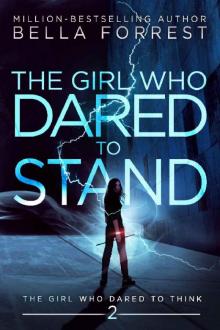 The Girl Who Dared to Stand
The Girl Who Dared to Stand A Gate of Night
A Gate of Night A Snare of Vengeance
A Snare of Vengeance A Twist of Fates
A Twist of Fates A Race of Trials
A Race of Trials A House of Mysteries
A House of Mysteries A Tide of War
A Tide of War Invaders
Invaders A Flight of Souls
A Flight of Souls Allies
Allies Renegades
Renegades A Clan of Novaks
A Clan of Novaks A Gift of Three
A Gift of Three A Ride of Peril
A Ride of Peril A Break of Day
A Break of Day Beautiful Monster
Beautiful Monster The Breaker
The Breaker A King of Shadow
A King of Shadow A Web of Lies
A Web of Lies The Gender Secret
The Gender Secret Stargazers
Stargazers The Girl Who Dared to Fight
The Girl Who Dared to Fight A Throne of Fire
A Throne of Fire A Shade of Novak
A Shade of Novak A Voyage of Founders
A Voyage of Founders A Clash of Storms
A Clash of Storms A Charge of Allies
A Charge of Allies A Shade of Dragon 2
A Shade of Dragon 2 The Girl Who Dared to Descend
The Girl Who Dared to Descend A Call of Vampires
A Call of Vampires The Spell
The Spell A Wind of Change
A Wind of Change Natural Law
Natural Law A Hero of Realms
A Hero of Realms Venturers
Venturers A Citadel of Captives
A Citadel of Captives A League of Exiles
A League of Exiles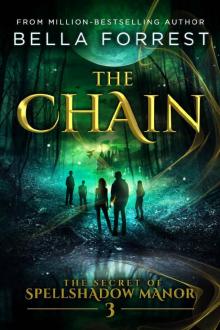 The Chain
The Chain A Game of Risk
A Game of Risk Deep Shadows
Deep Shadows A Land of Perfects
A Land of Perfects A Soldier of Shadows
A Soldier of Shadows A Shade of Vampire
A Shade of Vampire A Shade of Blood
A Shade of Blood A Dawn of Guardians
A Dawn of Guardians The Gender Lie
The Gender Lie A Fork of Paths
A Fork of Paths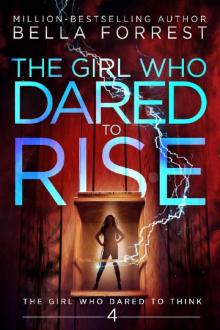 The Girl Who Dared to Rise
The Girl Who Dared to Rise Hotbloods
Hotbloods A Turn of Tides
A Turn of Tides The Gender End
The Gender End The Child Thief
The Child Thief A Shade of Kiev
A Shade of Kiev An End of Night
An End of Night A Shade of Doubt
A Shade of Doubt The Girl Who Dared to Think
The Girl Who Dared to Think A Rip of Realms
A Rip of Realms The Gender Fall
The Gender Fall A Bond of Blood
A Bond of Blood Traitors
Traitors The Gender War
The Gender War A Tip of Balance
A Tip of Balance An Empire of Stones
An Empire of Stones A Shade of Dragon 3
A Shade of Dragon 3 Coldbloods
Coldbloods A Valley of Darkness
A Valley of Darkness A Passage of Threats
A Passage of Threats Harley Merlin 19: Persie Merlin and the Door to Nowhere
Harley Merlin 19: Persie Merlin and the Door to Nowhere The Girl Who Dared to Lead
The Girl Who Dared to Lead A Meet of Tribes
A Meet of Tribes A Power of Old
A Power of Old A Vial of Life
A Vial of Life A Hunt of Fiends
A Hunt of Fiends A World of New
A World of New A Shade of Vampire 89: A Sanctuary of Foes
A Shade of Vampire 89: A Sanctuary of Foes A Den of Tricks
A Den of Tricks Harley Merlin 12
Harley Merlin 12 The Gender Plan
The Gender Plan A Shade of Vampire 85: A Shard of Soul
A Shade of Vampire 85: A Shard of Soul The Gender Game 2
The Gender Game 2 A Trail of Echoes
A Trail of Echoes A Dome of Blood
A Dome of Blood The Secret of Spellshadow Manor 2
The Secret of Spellshadow Manor 2 The Secret of Spellshadow Manor 6
The Secret of Spellshadow Manor 6 The Secret of Spellshadow Manor
The Secret of Spellshadow Manor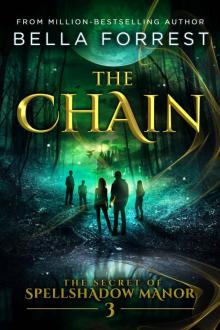 The Secret of Spellshadow Manor 3
The Secret of Spellshadow Manor 3 The Girl Who Dared to Endure
The Girl Who Dared to Endure A Bridge of Stars
A Bridge of Stars A Shade of Kiev 2
A Shade of Kiev 2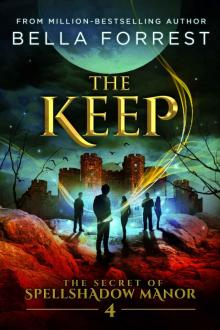 The Keep
The Keep A Touch of Truth
A Touch of Truth An Hour of Need
An Hour of Need A Spell of Time
A Spell of Time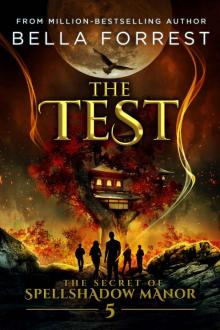 The Secret of Spellshadow Manor 5
The Secret of Spellshadow Manor 5 A Shade of Dragon
A Shade of Dragon A Battle of Souls
A Battle of Souls Bare Girl
Bare Girl A Day of Glory
A Day of Glory A Chase of Prey
A Chase of Prey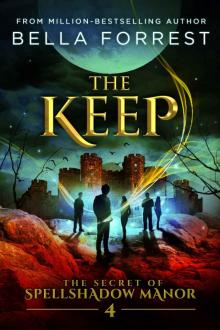 The Secret of Spellshadow Manor 4
The Secret of Spellshadow Manor 4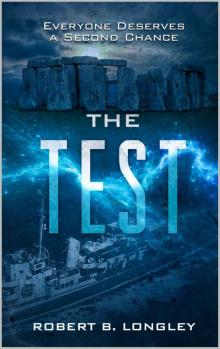 The Test
The Test A Shade of Vampire 32: A Day of Glory
A Shade of Vampire 32: A Day of Glory A Shade of Vampire 20: A Hero of Realms
A Shade of Vampire 20: A Hero of Realms A Shade of Vampire 54_A Den of Tricks
A Shade of Vampire 54_A Den of Tricks The Girl Who Dared to Think 6: The Girl Who Dared to Endure
The Girl Who Dared to Think 6: The Girl Who Dared to Endure A Shade of Vampire 23: A Flight of Souls
A Shade of Vampire 23: A Flight of Souls A Shade of Vampire 8: A Shade of Novak
A Shade of Vampire 8: A Shade of Novak The Gender War (The Gender Game #4)
The Gender War (The Gender Game #4) The Child Thief 4: Little Lies
The Child Thief 4: Little Lies A Shade of Vampire 9
A Shade of Vampire 9 A Shade of Vampire 46: A Ride of Peril
A Shade of Vampire 46: A Ride of Peril A Shade of Vampire 27: A Web of Lies
A Shade of Vampire 27: A Web of Lies Hotbloods 6: Allies
Hotbloods 6: Allies A Shade of Vampire 31: A Twist of Fates
A Shade of Vampire 31: A Twist of Fates A Shade of Vampire 43: A House of Mysteries
A Shade of Vampire 43: A House of Mysteries A Shade of Vampire 52
A Shade of Vampire 52 A Shade of Vampire 28: A Touch of Truth
A Shade of Vampire 28: A Touch of Truth A Shade of Vampire 44
A Shade of Vampire 44 A Shade of Vampire 14: A Dawn of Strength
A Shade of Vampire 14: A Dawn of Strength A Shade Of Vampire 5: A Blaze Of Sun
A Shade Of Vampire 5: A Blaze Of Sun A Shade Of Vampire 2: A Shade Of Blood
A Shade Of Vampire 2: A Shade Of Blood A Shade of Vampire 51
A Shade of Vampire 51 A Shade of Vampire 56_A League of Exiles
A Shade of Vampire 56_A League of Exiles The Gender Lie (The Gender Game #3)
The Gender Lie (The Gender Game #3) A Shade of Vampire 29
A Shade of Vampire 29 A Shade of Vampire 21: A Vial of Life
A Shade of Vampire 21: A Vial of Life A Shade of Vampire 27
A Shade of Vampire 27 A Shade of Vampire 33: A Dawn of Guardians
A Shade of Vampire 33: A Dawn of Guardians The Gender Game 5: The Gender Fall
The Gender Game 5: The Gender Fall A Shade Of Vampire 6: A Gate Of Night
A Shade Of Vampire 6: A Gate Of Night A Shade of Vampire 57: A Charge of Allies
A Shade of Vampire 57: A Charge of Allies A Shade of Vampire 48
A Shade of Vampire 48 A Shade of Vampire 8
A Shade of Vampire 8 A Shade of Vampire 35: A Race of Trials
A Shade of Vampire 35: A Race of Trials A Shade of Vampire 65: A Plague of Deceit
A Shade of Vampire 65: A Plague of Deceit A Shade of Vampire 64: A Camp of Savages
A Shade of Vampire 64: A Camp of Savages A Shade of Vampire 53_A Hunt of Fiends
A Shade of Vampire 53_A Hunt of Fiends A Shade of Vampire 22
A Shade of Vampire 22 A Shade of Vampire 63: A Jungle of Rogues
A Shade of Vampire 63: A Jungle of Rogues The Gender Game 2: The Gender Secret
The Gender Game 2: The Gender Secret A Shade of Vampire 47: A Passage of Threats
A Shade of Vampire 47: A Passage of Threats A Shade of Vampire 37: An Empire of Stones
A Shade of Vampire 37: An Empire of Stones A Shade of Vampire 57
A Shade of Vampire 57 A Shade of Vampire 30
A Shade of Vampire 30 A Shade of Vampire 39: A Rip of Realms
A Shade of Vampire 39: A Rip of Realms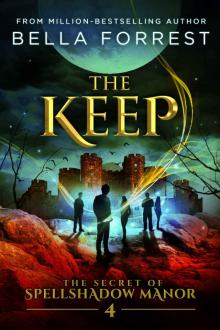 The Secret of Spellshadow Manor 4: The Keep
The Secret of Spellshadow Manor 4: The Keep A Shade of Vampire 50
A Shade of Vampire 50 Hotbloods Book 3_Renegades
Hotbloods Book 3_Renegades Hotbloods 8: Stargazers
Hotbloods 8: Stargazers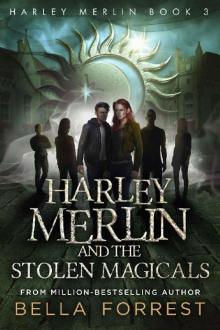 Harley Merlin 3: Harley Merlin and the Stolen Magicals
Harley Merlin 3: Harley Merlin and the Stolen Magicals A Shade of Vampire 10
A Shade of Vampire 10 A Shade of Vampire 51_A Call of Vampires
A Shade of Vampire 51_A Call of Vampires A Shade of Vampire 32
A Shade of Vampire 32 A Shade Of Vampire 2
A Shade Of Vampire 2 A Shade of Vampire 55
A Shade of Vampire 55 A Shade Of Vampire 6
A Shade Of Vampire 6 The Girl Who Dared to Think 3: The Girl Who Dared to Descend
The Girl Who Dared to Think 3: The Girl Who Dared to Descend A Shade of Vampire 23
A Shade of Vampire 23 A Shade of Vampire 37
A Shade of Vampire 37 A Shade of Vampire 43
A Shade of Vampire 43 A Shade of Vampire 61_A Land of Perfects
A Shade of Vampire 61_A Land of Perfects A Shade of Vampire 47
A Shade of Vampire 47 A Fall of Secrets
A Fall of Secrets The Secret of Spellshadow Manor 6: The Spell
The Secret of Spellshadow Manor 6: The Spell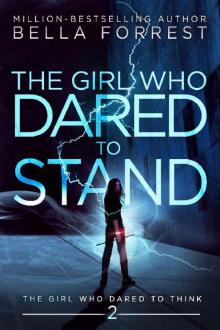 The Girl Who Dared to Think 2: The Girl Who Dared to Stand
The Girl Who Dared to Think 2: The Girl Who Dared to Stand A Shade of Vampire 46
A Shade of Vampire 46 A Shade of Vampire 66: An Edge of Malice
A Shade of Vampire 66: An Edge of Malice The Secret of Spellshadow Manor 2: The Breaker
The Secret of Spellshadow Manor 2: The Breaker The Child Thief 2: Deep Shadows
The Child Thief 2: Deep Shadows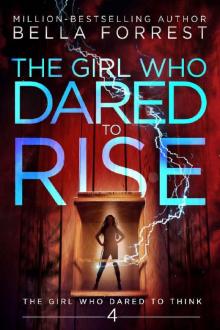 The Girl Who Dared to Think 4: The Girl Who Dared to Rise
The Girl Who Dared to Think 4: The Girl Who Dared to Rise Hotbloods 5_Traitors
Hotbloods 5_Traitors A Shade of Vampire 25
A Shade of Vampire 25 A Shade of Vampire 54
A Shade of Vampire 54 The Gender Game 4: The Gender War
The Gender Game 4: The Gender War A Shade of Vampire 19: A Soldier of Shadows
A Shade of Vampire 19: A Soldier of Shadows A Shade of Vampire 34
A Shade of Vampire 34 A Shade of Vampire 31
A Shade of Vampire 31 A Shade Of Vampire 5
A Shade Of Vampire 5 A Shade of Vampire 49
A Shade of Vampire 49 A Shade Of Vampire (The Mate)
A Shade Of Vampire (The Mate) Invaders_Hotbloods 7
Invaders_Hotbloods 7 A Shade of Vampire 36: A King of Shadow
A Shade of Vampire 36: A King of Shadow A Shade of Vampire 50: A Clash of Storms
A Shade of Vampire 50: A Clash of Storms A Shade of Vampire 35
A Shade of Vampire 35 A Shade of Vampire 21
A Shade of Vampire 21 A Shade of Vampire 25: A Clan of Novaks
A Shade of Vampire 25: A Clan of Novaks A Shade of Vampire 36
A Shade of Vampire 36 A Shade of Vampire 52_A Valley of Darkness
A Shade of Vampire 52_A Valley of Darkness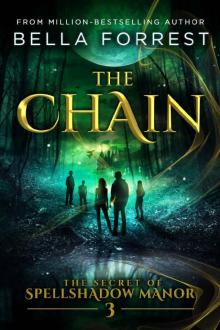 The Secret of Spellshadow Manor 3: The Chain
The Secret of Spellshadow Manor 3: The Chain A Shade of Vampire 42
A Shade of Vampire 42 A Shade of Vampire 58_A Snare of Vengeance
A Shade of Vampire 58_A Snare of Vengeance A Shade of Vampire 60_A Voyage of Founders
A Shade of Vampire 60_A Voyage of Founders A Shade of Vampire 39
A Shade of Vampire 39 A Shade of Vampire 29: An Hour of Need
A Shade of Vampire 29: An Hour of Need A Shade of Vampire 62_A Citadel of Captives
A Shade of Vampire 62_A Citadel of Captives A Shade of Vampire 33
A Shade of Vampire 33 A Shade of Vampire 16
A Shade of Vampire 16 A Shade of Vampire 41
A Shade of Vampire 41 A Shade of Vampire 13
A Shade of Vampire 13 A Shade of Vampire 20
A Shade of Vampire 20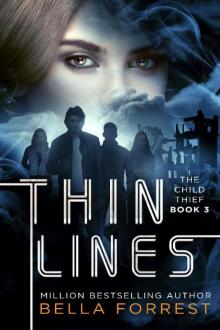 The Child Thief 3: Thin Lines
The Child Thief 3: Thin Lines A Shade of Vampire 45: A Meet of Tribes
A Shade of Vampire 45: A Meet of Tribes A Shade of Vampire 14
A Shade of Vampire 14 A Shade of Vampire 7
A Shade of Vampire 7 A Shade of Vampire 28
A Shade of Vampire 28 Bare Girl: A page-turning serial killer thriller (Detective Erin Bond Book 1)
Bare Girl: A page-turning serial killer thriller (Detective Erin Bond Book 1) A Shade of Vampire 44: A Tangle of Hearts
A Shade of Vampire 44: A Tangle of Hearts A Shade of Vampire 53
A Shade of Vampire 53 A Shade of Vampire 8: A Shade of Kiev
A Shade of Vampire 8: A Shade of Kiev A Shade of Vampire 49: A Shield of Glass
A Shade of Vampire 49: A Shield of Glass A Shade of Vampire 30: A Game of Risk
A Shade of Vampire 30: A Game of Risk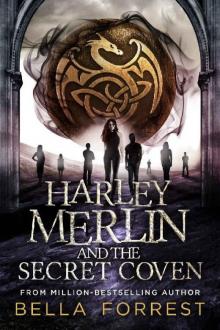 Harley Merlin and the Secret Coven
Harley Merlin and the Secret Coven A Shade of Vampire 24: A Bridge of Stars
A Shade of Vampire 24: A Bridge of Stars A Shade Of Vampire 4
A Shade Of Vampire 4 A Shade of Vampire 59_A Battle of Souls
A Shade of Vampire 59_A Battle of Souls Hotbloods 4: Venturers
Hotbloods 4: Venturers A Shade of Vampire 11
A Shade of Vampire 11 A Shade of Vampire 40: A Throne of Fire
A Shade of Vampire 40: A Throne of Fire A Shade of Vampire 15
A Shade of Vampire 15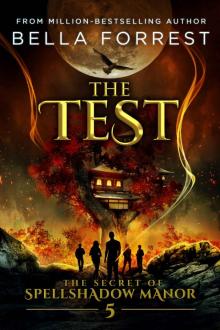 The Secret of Spellshadow Manor 5: The Test
The Secret of Spellshadow Manor 5: The Test A Shade of Vampire 56
A Shade of Vampire 56 A Shade of Vampire 41: A Tide of War
A Shade of Vampire 41: A Tide of War A Shade of Vampire 45
A Shade of Vampire 45 A World of New (A Shade of Vampire #26)
A World of New (A Shade of Vampire #26)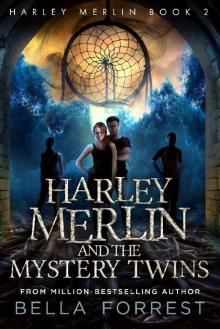 Harley Merlin 2: Harley Merlin and the Mystery Twins
Harley Merlin 2: Harley Merlin and the Mystery Twins A Shade of Vampire 19
A Shade of Vampire 19 A Shade of Vampire 48: A Tip of Balance
A Shade of Vampire 48: A Tip of Balance